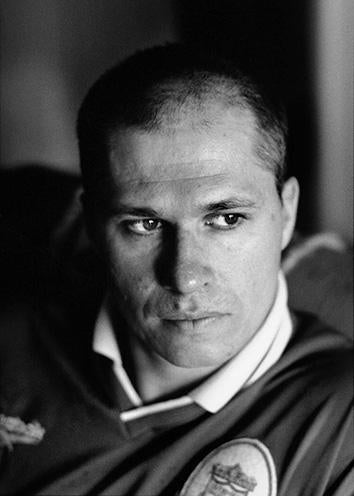Joshua Levin is not David Justice or Steve Austin or The Rock. It is not a name that conveys strength or courage or any other quality associated with rough-hewn masculinity. It is the name of a nebbish, a man who spends his days staring at a laptop screen and whose work output is, at best, one non-atrocious phrase per day. It is the name of a man who is his own worst enemy, and whose self-defeating behavior is devastatingly banal. Joshua Levin doesn’t dodge bullets; he dodges distractions on the Internet. The biggest risk to his health is the dreaded “inadvertent self-wedgie.”
Such are the struggles of Joshua Levin, the unintentionally testicle-mangling, overbite-having protagonist of Aleksandar Hemon’s novel The Making of Zombie Wars. And such are the struggles of Joshua Levin, the guy writing this sentence. More precisely, these are his struggles at moments like this one, when he’s trying to finish the second paragraph and everything he types sounds really stupid, and is he seriously writing in third person now? Jesus. This kind of paralyzing self-reflection—I bet it’s what the real Ignatius J. Reilly felt when he read A Confederacy of Dunces. At least, it’s what the real Ignatius J. Reilly felt if such a person ever existed, and I’m kind of surprised to report that, according to the online public records search that I just did for no good reason, there are flesh-and-blood people named Ignatius J. Reilly in Louisiana, Georgia, Texas, and Massachusetts. Like I was saying, Joshua Levin doesn’t dodge bullets. He dodges distractions on the Internet.
But really, honestly, I don’t have that much in common with Aleksandar Hemon’s Joshua Levin, the thirtysomething screenwriter with “the body of a lightweight wrestler who’d quit wrestling after middle school.” I am my very own Josh—hold the -ua, we’re all friends here—Levin, a thirtysomething journalist with the body of a malnourished basketball player who never played basketball. So I have enough distance from Hemon’s new comic novel to tell you that The Making of Zombie Wars is more than just a subtle yet comprehensive attack on my character and work ethic. It is also a breezy and funny examination of what happens when a man who’s “hungry for notable experiences” doesn’t anticipate the consequences of acquiring those experiences. And it’s about zombies, who are less hungry for notable experiences than they are for brains.
Hemon’s Levin is a familiar character even for those who don’t share his Semitic surname. An unremarkable man who’s highly aware of his unremarkableness, he can’t fathom why his girlfriend likes him but understands very well why his dreams of Hollywood success remain unfulfilled. For one thing, he can’t finish a screenplay. For another, his scripts are terrible, whether they’re populated by an elderly contract killer, a misfit DJ, or the flesh-eating, virus-infected zombies that appear in regular between-chapter interludes. (A representative concept: “A blind man and a blind woman, attracted to each other by smell. On their first date, they find themselves at a murder scene and catch the killer’s particular scent. Nobody believes them, and the perfumed killer is now pursuing them. Title: Where Do We Go from Nowhere.”) A Bosnian immigrant he meets in a screenwriting workshop assures Levin that his problems—crappy prose, general ennui—are “nothing compared with war and displacement and survival and all that heavy stuff.” “Your life,” the Bosnian tells him, “is warm blanket.”

Photo by Velibor Bozovic
Hemon ends the book’s first paragraph by noting that “[w]riting is nothing if not carrying the hopeless, backbreaking burden of decisions devoid of consequences,” which is way more profound than anything Joshua Levin or Josh Levin ever wrote. This truism is what leads Hemon’s Levin astray. Given his blanketed existence, he assumes that his own decisions will be just as inconsequential as the ones he’s putting down on the page—that nothing he can do will have the power to rip off that down-filled comforter.
One Levin to another, I can assure you, poor dumb Joshua, that a blanket is easier to dislodge than it seems—when you wake up in the morning, that thing is always on the floor. After he sleeps with one of the students in the ESL class he teaches, Levin at first feels no remorse for cheating on his girlfriend. Full of “the power of acting without regret … the freedom to take or do what you want,” he strides down the street with a new sense of potential and purpose. When his girlfriend Kimmy calls him “Jo,” he imagines, he’ll reintroduce himself in the manner of James Bond: “I’m Levin. Joshua Levin.”
But Joshua Levin, as Levins everywhere should understand from birth, is more schlemiel than secret agent. Actions have consequences, and Levin’s boring life quickly gets a lot less boring. His unstable landlord, perpetually bare-chested and brandishing a samurai sword that he claims can “slice a running dog in half,” soon becomes a trusted sidekick, albeit one who injures himself repeatedly while fending off enemies real and imaginary.
As Joshua Levin’s life spirals into madness, Hemon pulls off a clever inversion. In his screenwriting workshop, Levin explains that in his forthcoming Zombie Wars script, “Things get crazy, killers and zombies everywhere, chaos, no one to trust, nowhere to go. It’s a nightmare.” By the end of the book, Hemon has flipped the script. As things get even crazier, Levin’s ill-formed zombie movie sounds a lot more logical than anything that’s happening in his own ill-formed life. Some advice, from one Levin to another: Yes, a warm blanket sometimes feels like a straitjacket, but it’s also quite cozy. I think I’ll get under one right now, and see what’s new on the Internet.
—
The Making of Zombie Wars by Aleksandar Hemon. Farrar, Straus and Giroux.
See all the pieces in this month’s Slate Book Review.
Sign up for the Slate Book Review monthly newsletter.
